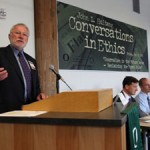Resource:
Journalist’s Resource

- Links: Website | Twitter | Facebook | Database | Tips & Training | Research Chats
- Tags: Academy, Education, Social Science Research, Tips, Tools, Training
Unlike most journalistic stories or blogs, academic studies are the product of months or years of work; they can include analysis of large sets of data or carefully conducted experiments. A scholar might finish just a few important studies in his or her career, often on problems that have been studied for decades. Studies aspire to say as much as can definitively be known on a particular question, be it complex or seemingly self-evident. Does money in politics cause corruption? You may consider that an obvious question, but for scholars the answer — not just yes or no, but also why and how — has to be proven with precise weighing of evidence. The essence of the scientific method is to come up with a hypothesis, test it, and then make sure it can be repeated – and that no external factors skewed the results.
Many corporations, commercial research firms, advocacy groups and consulting firms also produce studies and in-depth reports. While these can have news value, bear in mind that the findings of such work are not always independently fact-checked prior to publication, whereas studies produced by academic scholars typically are.
Why would a journalist want to read a study?
In a world overflowing with information of uncertain quality, it’s hard to find knowledge that is as unbiased, thoughtful and reliable as that contained in the best academic studies. This is why journalists should be familiar with how to read them. Studies can provide a baseline of solid fact where reporting can begin. When journalists call experts to hear their views, having familiarity with the basic research allows for more enlightening conversations and makes stories deeper. Studies almost always suggest a wealth of new angles for journalists to pursue. Further, journalists are connection points between information and the public; it is a journalist’s job to make things clear to the public that are often hidden. Sometimes this means misdeeds by public officials or large corporations. But sometimes important insights can be locked away in research studies and journals. Understanding how to read studies can allow you to bring sunlight to issues and knowledge that might otherwise remain obscure.” Source: Journalist’s Resource
The Journalism Accelerator is not responsible for the content we post here, as excerpts from the source, or links on those sites. The JA does not endorse these sites or their products outright but we sure are intrigued with what they’re up to.









Weigh In: Remember to refresh often to see latest comments!
0 comments so far.